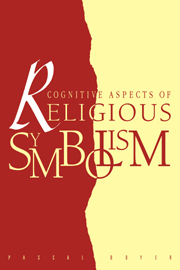Book contents
- Frontmatter
- Contents
- List of contributors
- I Cognitive processes and cultural representations
- II The structure of religious categories
- 3 Computational complexity in the cognitive modelling of cosmological ideas
- 4 ‘Earth’ and ‘path’ as complex categories: semantics and symbolism in Kwaio culture
- 5 Domain-specificity, living kinds and symbolism
- 6 Pseudo-natural kinds
- III Acquisition and belief fixation
- IV The structure of ritual action
- References
- Index of names
- Subject Index
6 - Pseudo-natural kinds
Published online by Cambridge University Press: 05 November 2011
- Frontmatter
- Contents
- List of contributors
- I Cognitive processes and cultural representations
- II The structure of religious categories
- 3 Computational complexity in the cognitive modelling of cosmological ideas
- 4 ‘Earth’ and ‘path’ as complex categories: semantics and symbolism in Kwaio culture
- 5 Domain-specificity, living kinds and symbolism
- 6 Pseudo-natural kinds
- III Acquisition and belief fixation
- IV The structure of ritual action
- References
- Index of names
- Subject Index
Summary
The starting point of this chapter consists of two simple, seemingly trivial observations. The first one is that, in any particular culture, there are definite limits to the range of beliefs people entertain about religious agencies and events. The existence of such limits accounts for the relative convergence of people's beliefs and statements about such matters. The second observation is that explicit tuition can only account for part of this convergence. This is especially striking in contexts of oral religious tradition, in which explicit tuition is often minimal. In order to ‘go beyond the information given’, specific heuristics must therefore be activated. Here I will try to describe some such heuristics, which consist in applying to religious matters implicit assumptions which govern the representation of non-religious domains of reality. I will try to describe certain cognitive processes of belief formation and fixation, and examine to what extent they make it possible to account for some recurrent features of religious symbolism.
Social categories and identification
Let me turn to an ethnographic example, which will illustrate the difficulties of the question. Among the Fang of Cameroon, some people are said to possess an internal organ called evur, which allows them to display particular talent in various undertakings outside the domain of everyday activities. People with great oratory skills or a particular ability in business, people whose plantations are especially successful, are commonly said to be beyem, that is, having an evur. Many cases of illness or misfortune are caused by the state of the patient's evur. The notion is crucial in the domain of magic and witchcraft.
- Type
- Chapter
- Information
- Cognitive Aspects of Religious Symbolism , pp. 121 - 142Publisher: Cambridge University PressPrint publication year: 1993
- 8
- Cited by



